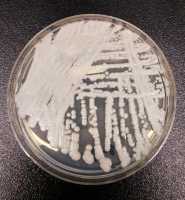
02 Aug Drug Resistant Candida auris Presents Urgent Threat
MedicalResearch.com Interview with:

This image depicts a strain of Candida auris cultured in a petri dish at the Centers for Disease Control and Prevention
Credit: Shawn Lockhart
Snigdha Vallabhaneni, MD, MPH
Centers for Disease Control and Prevention
Atlanta, GA
MedicalResearch.com: What is the background for this study?
Response: We are concerned about the fungus Candida auris (or C. auris) because it causes serious infections, is often resistant to medications, and continues to spread at alarming rates in U.S. healthcare settings. Candida. auris primarily affects patients in who are hospitalized for a long time or are residents of nursing homes that take care of patients on ventilators. C. auris is still rare in the United States and most people are at low risk of getting infected. People who get C. auris or other Candida infections are often already sick from other medical conditions and often have invasive medical care, including ventilators for breathing support, feeding tubes, central venous catheters, and have received lots of antibiotics. Many patients infected and colonized with C. auris move frequently between post-acute care facilities and hospitals, which increases the risk of spreading C. auris between facilities.
MedicalResearch.com: What are the main findings?
Response: Candida auris is an urgent threat because many strains are resistant to at least 2 of the 3 major classes of antifungal drugs.
C auris is commonly transmitted between patients in health care settings, causing outbreaks that not only affect a single facility but also spread through networks of facilities. The ability of C auris to persist in and contaminate the health care environment and medical devices likely contributes to these outbreaks.
Early identification of C auris is key to controlling its spread.
MedicalResearch.com: What should readers take away from your report?
Response: Candida auris is a newly emerging fungus. It is concerning because it can cause invasive infections, is difficult to treat because of high levels of drug resistance, and it spreads easily in hospitals and certain kinds of nursing homes. Earl detection is the key to controlling spread.
MedicalResearch.com: What recommendations do you have for future research as a result of this work?
Response: Future research is needed to address these questions about C. auris:
Where did it come from? What characteristics enable its high resistance and rapid spread? What is its environmental niche, and what factors in the environment potentiate its rapid emergence? Rapid diagnostic tests and effective decolonization methods are urgently needed. We do know that preventing the spread of this organism is a priority that requires bolstering laboratory detection capacity; strengthening public health surveillance; and improving infection control practices, especially in postacute care settings.
MedicalResearch.com: Is there anything else you would like to add?
Response: We would like to emphasize again, that this is still very rare in the U.S. Most healthy people are not going to be at risk for C. auris infections.
No disclosures.
Citation:
Candida auris: An Emerging Antimicrobial Resistance Threat
Snigdha Vallabhaneni, MD, MPH; Brendan R. Jackson, MD, MPH; Tom M. Chiller, MD, MPHTM
Published Ann Intern Med. 2019. DOI:10.7326/M19-2205
[wysija_form id=”3″]
[last-modified]
The information on MedicalResearch.com is provided for educational purposes only, and is in no way intended to diagnose, cure, or treat any medical or other condition. Always seek the advice of your physician or other qualified health and ask your doctor any questions you may have regarding a medical condition. In addition to all other limitations and disclaimers in this agreement, service provider and its third party providers disclaim any liability or loss in connection with the content provided on this website.
Last Updated on August 2, 2019 by Marie Benz MD FAAD
